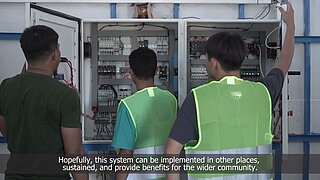Supporting local fisheries with solar energy

Following extensive technology development, transfer and trial, the first Indonesian-produced Solar Ice Maker in Sulamu, East Nusa Tenggara, is now in full operation.
As the largest archipelagic nation, Indonesia also holds a spot among the world’s top fish producing countries. Data from the Indonesian Ministry of Marine Affairs and Fisheries recorded more than 1.2 million ton of fish were exported in 2021. Despite that large export number, Indonesia’s fishery sector encounters a huge value loss, mainly due to inadequate availability of electricity and cooling options in the coastal areas. Preserving the quality of the catch are more challenging for small-scale fisheries with traditional cooling options.
To preserve their daily catch, local fishermen in Sulamu have had to take a one-hour trip, only to fetch ice blocks in Kupang, the capital of the province. The local statistics office (BPS Kupang, 2018) recorded Sulamu’s potential fish production to be above 1,000 ton. Unfortunately, at least 50 percent of the potential went to waste, mainly due to poor storage.
1 tonne of ice per day - completely emission-free
The Solar Ice Maker facility in Sulamu is designed to meet 56 percent of ice block demand in the area. Relying entirely on solar power and a small battery system, the Solar Ice Maker in Sulamu can produce up to 1 ton of ice blocks per day, without utilising fossil fuel. The technology also uses the R290 natural cooler, making it 100 percent carbon emission-free. The Solar Ice Maker also highlights the optimisation of the renewable energy source that is abundantly available in East Nusa Tenggara.
Involving international, national, and local stakeholders, the Solar Ice Maker facility-launching event was held in October 2022, and followed by a round of panel discussion. Andriah Feby Misna, Director of Various New and Renewable Energy of the Indonesian Ministry of Energy and Mineral Resources, officially launched the facility through a ribbon-cutting ceremony. Representatives from the German Embassy, local government representatives, private sector partners and investors, as well as a group of Sulamu’s local fishermen also attended the event.
Quoting the Director General of New and Renewable Energy, Dadan Kusdiana, “The solar ice maker pilot project provides an example of how renewable energy can bring benefit to sectors other than energy, in this case the fishery sector. What is also important is to support local economy which will also improve the national economy”. He also appreciated all parties involved in the development of the technology. “We see that the development and implementation of the solar ice maker have gone through an extensive process, from just an idea and now it is a real thing, thanks to collaboration and cooperation among multiple parties. Hopefully the hard work of everyone involved will pay off with maximum benefits for the welfare of the Indonesian society,” he conveyed.
The link has been copied to the clipboard
Contact
IKI Office
Zukunft – Umwelt – Gesellschaft (ZUG) gGmbH
Stresemannstraße 69-71
10963 Berlin
Further information
The Solar Ice Maker is the result of a private sector collaboration, supported by the German-Indonesian cooperation with fundings from the International Climate Initiative (IKI) and the German Federal Ministry for the Economic and Development Cooperation (BMZ) under various projects, and in collaboration with the Dresden Institute for Air Handling and Refrigeration (ILK).The Solar Ice Maker is the result of a private sector collaboration, supported by the German-Indonesian cooperation with fundings from the International Climate Initiative (IKI) and the German Federal Ministry for the Economic and Development Cooperation (BMZ) under various projects, and in collaboration with the Dresden Institute for Air Handling and Refrigeration (ILK).







![[Translate to English:]](/legacy/_processed_/5/5/csm_Indien_EE_Solar_Frau_bfcf99c425.jpg)